A simple guide to the 2019 NI general election
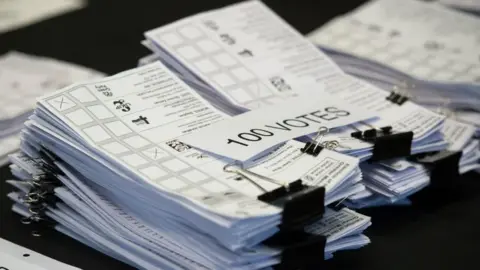 Getty Images
Getty ImagesVoters and parties in Northern Ireland are set to go to the polls for a third time this year.
On Tuesday evening, MPs backed a government bill calling for an election on 12 December.
The 10 Democratic Unionist Party (DUP) MPs voted in favour, while Independent MP Lady Sylvia Hermon voted against.
Here's what you need to know ahead of a Westminster election.
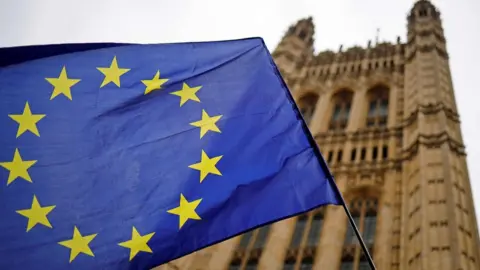 AFP/Getty Images
AFP/Getty ImagesWill Brexit be the main campaign issue?
Almost certainly, because with Parliament stuck on Boris Johnson's Brexit deal, it seems the parties in Northern Ireland will be split on the issue too.
The DUP has vehemently opposed the revised deal because it would lead to NI and Great Britain being treated differently.
It is the only one of the main parties in Northern Ireland which supports Brexit.
The main pro-remain parties - Sinn Féin, the Social Democratic and Labour Party (SDLP) and Alliance - will argue against the DUP's strategy.
The Ulster Unionist Party (UUP) will try to distinguish its brand of unionism and single out the DUP for propping up the government's Brexit negotiations.
The party was split during the 2016 referendum, although it officially campaigned to remain.
While outgoing leader Robin Swann backed leave, his successor Steve Aiken has since said it would be better for the whole of the UK to remain in the EU than take the prime minister's Brexit deal.
Who will run?
There are 18 Westminster constituencies in Northern Ireland, meaning 18 seats out of 650 in the Commons are up for grabs.
The DUP holds 10 seats, Sinn Féin has seven - but its MPs do not take their seats due to a long-standing policy of abstentionism - and independent unionist Lady Hermon held North Down - but she has announced she will not run again.
She faced stiff competition for it from the DUP in 2017, who are vying again to win the seat, while the Ulster Unionists and Alliance will be attempting to snatch it too.
Alliance will stand in East Belfast, to try and reclaim the seat from DUP MP Gavin Robinson.
Party leader Naomi Long held it between 2010 and 2015, when she lost it to him and he successfully retained it in 2017.
Mrs Long is now an MEP in Brussels, having won the seat for Alliance for the first time in May.
Why are pacts back in the picture?
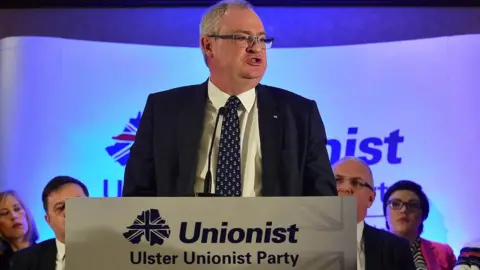 PAcemaker
PAcemakerThe new leader of the UUP, Steve Aiken, only took over on 9 November, and originally vowed that the party would not to stand aside in any constituency this time.
Unionist parties have traditionally agreed electoral pacts in certain constituencies in order to maximise the number of unionist MPs at Westminster.
They feel that if the unionist vote is split between them it means it is more likely a nationalist MP will take the seat.
Mr Aiken said his party would stand in all 18 constituencies, which sparked concern from others within unionist circles that key seats could be at risk.
DUP leader Arlene Foster said if there was not a pact, North Belfast MP Nigel Dodds could lose his seat and accused Mr Aiken of wanting to "hand away seats to Sinn Féin".
In Fermanagh and South Tyrone a unionist pact secured the UUP a seat for Tom Elliott in 2015 - but he lost it to Sinn Féin's Michelle Gildernew two years later.
The DUP has said it will not stand a candidate in Fermanagh and South Tyrone, to support the Ulster Unionists in their bid for the seat.
In turn, Mr Aiken later confirmed the UUP will not field a candidate in North Belfast and said the choice in the constituency was between Nigel Dodds or "an abstentionist MP".
The SDLP has said it will not be contesting the Westminster seat in North Belfast for the first time in the party's history.
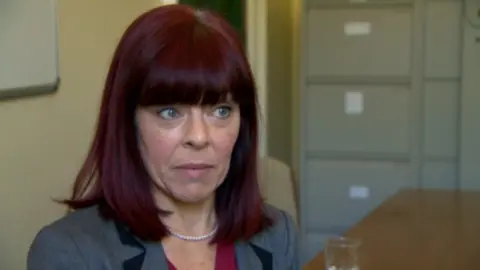
It is one of three constituencies which it will not fight in a bid to secure the seat for pro-remain candidates. The other two constituencies are East Belfast and North Down.
Sinn Féin will not run in three constituencies in the general election - South Belfast, East Belfast and North Down.
It is urging its voters to back the pro-remain candidates in those constituencies.
The Green Party leader Clare Bailey has said she will not stand in South Belfast, and is endorsing the SDLP's candidate.
The party has also said it will not run in the other three Belfast constituencies, in a bid to help return more pro-remain MPs to Westminster.
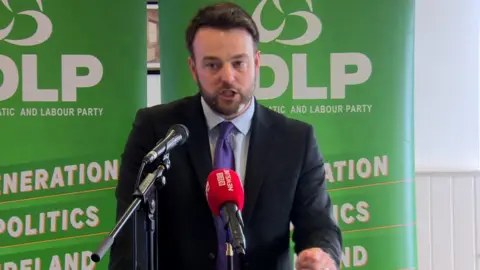
What about other key battlegrounds?
In June 2017, the SDLP suffered a shock defeat in Foyle with ex-party leader Mark Durkan losing to Sinn Féin's Elisha McCallion.
Traditionally an SDLP stronghold, the party is keen to win it back and current party leader Colum Eastwood has confirmed he will run this time - so that race could be tight.
South Belfast is also an interesting constituency.
It's currently held by DUP MP Emma Little-Pengelly, but the SDLP and Alliance believe they are also respectively in contention to secure it.
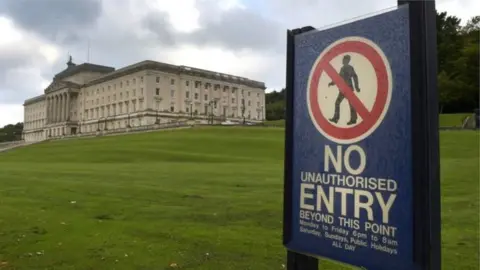
What will it mean for Stormont talks?
Northern Ireland has been without a government for almost three years, after power-sharing partners the DUP and Sinn Féin split in a bitter row.
The UK government has said it is engaged in talks with the parties to restore the institutions - but efforts in recent weeks have been flat due to the Brexit deadlock.
Expect talks to grind to a halt entirely in an election period.
With battle lines between the parties drawn in a bid to win seats, it would be hard to imagine the parties setting aside their differences to get the institutions in Northern Ireland back up and running.
In the meantime the government will continue to take some decisions, along with day-to-day governmental business being overseen by civil servants.
After the election, fresh talks have been promised ahead of a 13 January 2020 deadline - if those talks fail, it is likely a fresh assembly election could take place.
